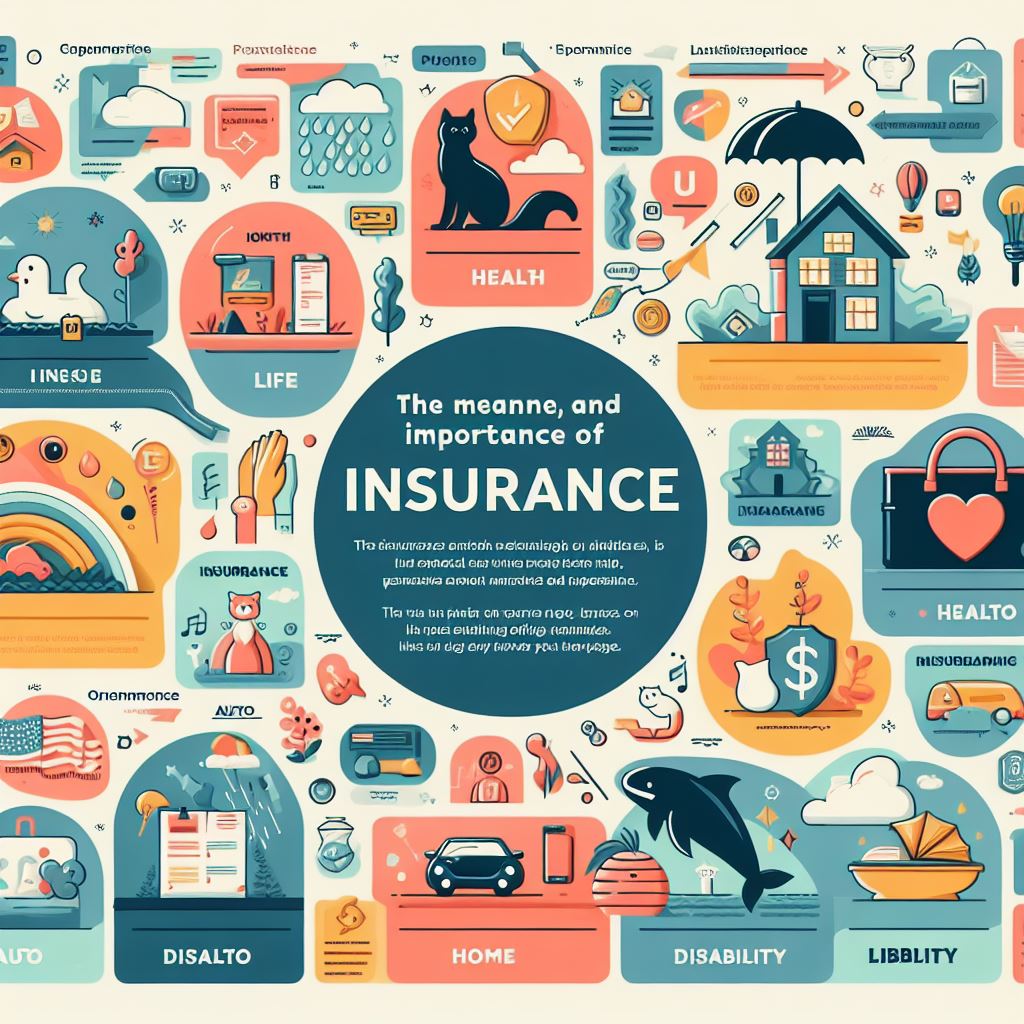A Comprehensive Guide to Insurance: Definition and Types

Insurance is a contract between two parties: the insurance company (insurer) and the individual (insured). In this arrangement, the insurance company promises to compensate for financial losses due to specific contingencies or risks in return for the premiums paid by the insured individual.
Here are the main types of insurance along with their brief descriptions:
- Life Insurance or Personal Insurance: Life insurance provides financial protection to the insured person’s family or beneficiaries in the event of their death. It ensures that loved ones receive a payout (the sum assured) to cover expenses or replace lost income.
- Property Insurance: Property insurance covers physical assets such as homes, buildings, and belongings. It protects against risks like fire, theft, or natural disasters. Homeowners’ insurance and renters’ insurance fall under this category.
- Marine Insurance: Marine insurance covers risks related to shipping and transportation of goods by sea. It includes cargo insurance, hull insurance (for ships), and freight insurance.
- Fire Insurance: Fire insurance specifically protects against damage or loss caused by fire. It is commonly purchased by homeowners and businesses.
- Liability Insurance: Liability insurance covers legal responsibilities arising from injury or damage caused to a third party. For example, auto liability insurance covers damages caused by your vehicle to others.
- Guarantee Insurance: Guarantee insurance ensures that a third party fulfils their contractual obligations. It is often used in construction projects or other business agreements.
Remember that each type of insurance has its own terms, conditions, and coverage limits. Understanding how insurance works and considering factors like premiums, policy limits, and deductibles can help you choose the right insurance policy for your needs..
Insurance, a shield against the unpredictable twists of life, serves as a financial safety net for individuals and businesses alike. In this article, we will delve into the meaning of insurance, and its historical roots, and explore the diverse types that cater to various needs and risks.
- A Comprehensive Guide to Insurance: Definition and Types
Importance of Insurance

Insurance goes beyond being a mere financial tool; it’s a lifeline that safeguards against unexpected events. The significance of insurance lies not only in monetary protection but also in the peace of mind it offers to individuals and businesses, allowing them to navigate uncertainties with greater confidence.
- How to Train a Dog
- How to Potty Train a Dog
- Scientific reason behind dog chasing: Why do dogs chase in the toilet?
- How Truck Accident Lawyers Can Help.
- A Guide to Hiring an Auto Accident Lawyer
Historical Overview of Insurance
The concept of insurance traces back centuries, with early practices found in ancient societies. From informal arrangements to the structured systems we have today, insurance has evolved to meet the changing needs of societies and economies.
Key Concepts in Insurance
Understanding insurance requires familiarity with key terms such as premiums, which are regular payments made by policyholders, and policy terms that outline the coverage duration and conditions. The roles of the insured (policyholder) and insurer (insurance company) are fundamental to the insurance relationship.
Types of Insurance

Life Insurance:
Life insurance provides a financial safety net for the beneficiaries of the insured in case of the policyholder’s demise. It can also include investment or savings components.
Health Insurance:
Designed to cover medical expenses, health insurance encompasses hospitalization, surgeries, and prescription drugs, providing a crucial shield against rising healthcare costs.
Auto Insurance:
Auto insurance shields against financial losses resulting from accidents, theft, or damage to vehicles. It typically includes liability coverage for bodily injury and property damage.
Property Insurance:
This category includes coverage for homes, commercial buildings, and personal belongings. Homeowners and renters insurance fall under this umbrella, protecting against property damage and liability.
Business Insurance:
Businesses face a spectrum of risks, and business insurance covers areas such as property damage, liability, and business interruption, ensuring continuity in the face of adversity.
Specialized Insurance
Cyber Insurance:
In an increasingly digital world, cyber insurance protects individuals and businesses from financial losses due to cyber threats, including data breaches and ransomware attacks.
Kidnap and Ransom Insurance:
A niche but crucial form of insurance, it provides coverage in situations involving kidnapping, extortion, or hijacking.
- How to Train a Dog
- How to Potty Train a Dog
- Scientific reason behind dog chasing: Why do dogs chase in the toilet?
- How Truck Accident Lawyers Can Help.
- A Guide to Hiring an Auto Accident Lawyer
Risk Mitigation
Insurance plays a pivotal role in managing risks, offering individuals and businesses the ability to mitigate financial losses. It becomes an integral part of comprehensive financial planning, providing a safety net against unexpected events.
Choosing the Right Insurance
Selecting the right insurance involves assessing individual needs and understanding policy terms. A tailored approach ensures that the coverage aligns with specific requirements, preventing over-insurance or gaps in protection.
Claims Process
The claims process is a critical aspect of insurance. Policyholders must be aware of the steps involved in filing a claim and the common reasons for claim denial. Being informed enhances the effectiveness of the insurance relationship.
Future Trends in Insurance
The landscape of insurance is evolving with technological advancements. From innovative products to the integration of artificial intelligence, the future promises a dynamic and responsive insurance sector.
Challenges in the Insurance Industry
While insurance adapts to changing times, challenges persist. Regulatory changes and an increasing concern for fraud pose hurdles that the industry must navigate.
Global Perspectives on Insurance
Different countries adopt varied approaches to insurance. Exploring international trends provides insights into the adaptability and diversity within the insurance sector.
The Role of Insurtech
Technological disruptions, often referred to as Insurtech, are reshaping the insurance industry. From online platforms to data analytics, technology is enhancing efficiency and customer experience.
Conclusion
In conclusion, insurance is a multifaceted tool that not only cushions against financial shocks but also fosters a sense of security. The diverse types of insurance cater to a broad spectrum of needs, and the evolving landscape, driven by technology, promises a more dynamic and responsive future.
- How to Train a Dog
- How to Potty Train a Dog
- Scientific reason behind dog chasing: Why do dogs chase in the toilet?
- How Truck Accident Lawyers Can Help.
- A Guide to Hiring an Auto Accident Lawyer
FAQs
How do I choose the right insurance for my needs?
- Assess your specific needs and understand the policy terms. Seek professional advice if needed.
What factors impact insurance premiums?
- Various factors, including age, health status, and coverage amount, can influence insurance premiums.
Is cyber insurance necessary for individuals?
- While primarily designed for businesses, individuals with a significant online presence may find cyber insurance beneficial.
How often should I review my insurance coverage?
- Regularly review your coverage, especially after life events like marriage, birth, or significant purchases.
Can insurance policies be customized to specific needs?
- Yes, many insurance policies offer customization options to tailor coverage to individual requirements.
